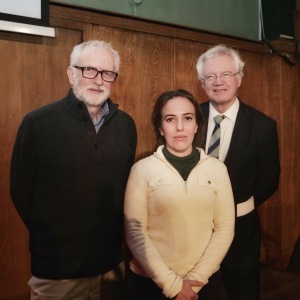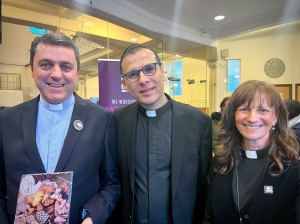by Nicola Grove
In this article Nicola Grove reflects on how rarely these days do we hear from the people actually involved in the issues of the day. In between stand commentators, presenters, pundits, opponents and supporters. Quakers too sometimes do this, excluding the voices of those marginalised by mainstream media.
I was in an online meeting about how to enable the stories of marginalised people to be told; in this case focusing on disability. Family members were prominent, sharing moving and often uplifting accounts of personal connections. But because my work focuses on participation, I was struck by the absence of the individuals themselves. We were hearing the stories of their allies, but were these the stories that they themselves would want to tell?
Cut to a wonderful exhibition about displacement. As well as contemporary images and installations, there were powerful art works dating back to the Spanish civil war and World War II. The curator had added her comments – that one disturbing charcoal sketch of refugees risked dehumanising them by presenting a faceless mass. (For the record, I didn’t agree, I could easily discern individuals amongst the trudging crowd). But what would displaced people themselves think? We don’t know, because nobody had thought to ask them.
How do people want to be represented? How do they feel about being seen as vulnerable victims? What do they think about the programmes we run, that we are certain are vital to their survival? What do they want us to do? Have we asked them?
Quakers are not immune to this trend. I have been reading through Quaker responses to the unfolding genocide in Palestine. Strong statements and letters are written in our name by the various bodies in British Yearly Meeting. The letter pages of the Quakers’ Friend magazine have provided contrasting views over many years about whether criticism of Israel is de facto antisemitism. In the body of the magazine we have read recently that perhaps war crimes are not something we should focus on, since all war is a violation. The inferences are clear – we need to question our “progressive” stance on, say, settler colonialism, on self determination, on any ideas that Hamas might be an evolving, complex, multifaceted organisation. Similarly, a book is reviewed that exhorts us to adopt the concept of Israelophobia, whilst distorting (to put it mildly) the history of Palestine and Palestinians. We are now told that to invite Jeremy Corbyn, a leading campaigner and politician who has spent his life working for peace and justice to give a public lecture at the same time as the Quaker Yearly Meeting would be to risk accusations of antisemitism and “damage the reputation” of Quakers.
Do you notice any absent voices here? Where are the Palestinian voices? Where is the voice of the banned speaker, Jeremy Corbyn?

Assange at Conway Hall with David Davies MP
I will leave the final words to Pastor Isaac Munther from Bethlehem, another absent voice. Astonishingly, no Quaker outlets publicised his metanoiac Christmas sermon “Christ under the Rubble”, nor covered his visit to London in February, apart from a link in a recent newsletter to one minute of a candlelit vigil. Perhaps his words are too dangerous for Friends to hear, because they challenge our comfortable thinking that as Quakers we are principled, impartial, peace-loving. And that this stance is enough, quite enough, to prove how much we are suffering on behalf of others.

What did Pastor Munther actually say about us? He said: “This is not about “praying for peace” “raising concern” or “sending support”. Piety, religiosity, true spirituality means the active participation in loosing the bonds of injustice, undoing the straps of the yoke, letting the oppressed go free, and breaking every yoke. This is active solidarity, this is action.”
Nicola Grove, 23 March 2024.
[Another version of this article later appeared in the Friend magazine on 05 April 2024.]

Leave a comment